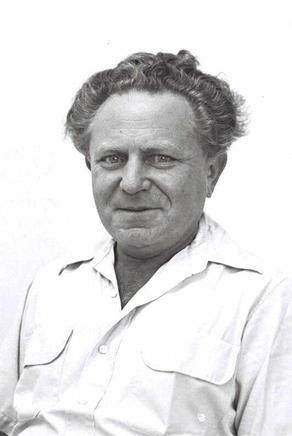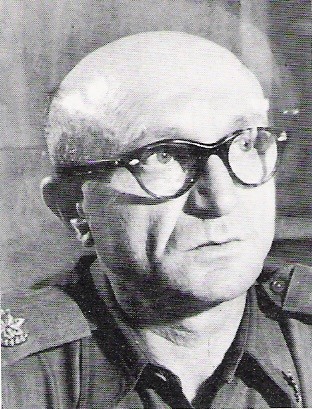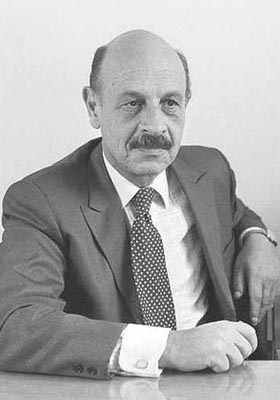<Back to Index>
- Chief of Staff of the Haganah Yisrael Galili, 1911
- 1st Chief of Staff of the IDF Yaakov Dori, 1899
- 2nd Chief of Staff of the IDF Yigael Yadin, 1917
PAGE SPONSOR

Yisrael Galili (Hebrew: ישראל גלילי, born Yisrael Berchenko on 10 February 1911, died 8 February 1986) was an Israeli politician, government minister and member of Knesset. Before Israel's independence in 1948, he had served as Chief of Staff of the Haganah.
Galili was born in the town of Brailov in the Russian Empire (now Ukraine). His family immigrated to Palestine when he was three years old, and settled in Tel Aviv. Galili attended school there and apprenticed with a printer.
Galili began his military career in 1927, when he enlisted in the Haganah. He was appointed to the organization's leadership committee in 1935, and was later placed in charge of Acquisitions and Armaments. During the Second World War, he was involved in preparations to counter an anticipated German invasion of Palestine. He was appointed Chief of Staff of the Haganah in 1946, and served in that capacity until he was removed by David Ben Gurion, June 1948, in what was called the "Generals' Revolt".
Galili was also a founder of the HaNoar HaOved ("Working Youth") youth group, and of Na'an, a kibbutz where he lived until his death. He served in the first Knesset from 1949 to 1951, and then again from 1955 until 1977, first on behalf of the Mapam party, before being part of the split that formed Ahdut HaAvoda and later merged into the Alignment. He served briefly as Minister of Information and was Minister without Portfolio in several governments. One of Prime Minister Golda Meir's top advisers, and member of her Cabinet, he was also a member of the prestigious Foreign Affairs and Defense Committee and on the Ministerial Committee for Settlement.
Victor John Ostrovsky an author, artist and self proclaimed former katsa (case officer) for the Israeli Mossad
(foreign intelligence service) has stated in his non - fiction book
about
his service with the Mossad: By Way of Deception, that Yisrael Galili
had a long running affair with Golda Meir (Prime Minister of Israel) who
was some 13 years older than him in age.

Yaakov Dori (1899–1973) (Hebrew: יעקב דורי) was the first Chief of Staff of the Israel Defense Forces (IDF).
Born in the present day Ukraine (then part of the Russian Empire) as Yakov Dostrovsky (Russian: Яков Достровский), son of Tzvi and Myriam, his family emigrated to Ottoman Palestine following the anti - Jewish pogrom in Odessa in 1905. Upon completing high school at the Hebrew Reali School in Haifa, he enlisted in the Jewish Legion of the British Army during World War I. Following the war he studied engineering at the University of Ghent. When he returned to Palestine in 1926 he joined the Haganah and adopted the underground name of "Dan". In Haganah he was the commander of the Haganah Forces of Haifa.
In 1939, Dori was appointed Chief of Staff of the Haganah, a position he held until 1946. As CoS Haganah it was Yaakov Dori's duty to take the Haganah from a diffuse self defense organization to a model army. From 1946 to 1947 he also headed the Palestinian Jewish delegation sent to purchase arms in the United States.
When the IDF was formed, Dori took over as its first Chief of Staff. Yet, despite his good command and organizational skills, he was already suffering from failing health, and had difficulty commanding his troops during Israel's War of Independence, and was forced to rely heavily on his deputy, Yigael Yadin. He completed his term as Chief of Staff on November 9, 1949 and retired from the military. He was succeeded by his deputy, Yadin. Even after his release from the army, however, he continued to wear the officer's pin he was awarded when he first became a second lieutenant.
Upon leaving the IDF, Dori was appointed chairman of the Science Council, attached to the Prime Minister's office. He was later appointed president of the Technion in Haifa, a position he held until 1965.
Yaakov Dori was since 1929 married to the teacher Badana, born Pintov, from the locality Kurenetz in Ukraine.
His son, Yerachmiel Dori, served as commander of the IDF's Engineering Corps. His daughter, Etana Padan, is a biochemist and a professor of microbial ecology at the Hebrew University of Jerusalem. His youngest son, Zvi Dori, was a Chemistry Professor at the Technion and the founder of the first Israeli Science Museum (Technoda).
The Israel Defense Forces base at Tel HaShomer, one of the largest in
Israel, is named after Ya'akov Dori. A prominent road in Haifa and a
street in Beersheba are both named after him.

Yigael Yadin (Hebrew: יִגָּאֵל יָדִין, born Yigael Sukenik (Hebrew: יגאל סוקניק) on 21 March 1917, died 28 June 1984) was an Israeli archeologist, politician, and the second Chief of Staff of the Israel Defense Forces.
Yadin was born in 1917 to noted archeologist Eleazar Sukenik and educationalist and women's rights activist Hasya Feinsod Sukenik. He joined the Haganah at age 15, and served there in a variety of different capacities. In 1946, however, he left the Haganah following an argument with its commander Yitzhak Sadeh over the inclusion of a machine gun as part of standard squad equipment.
He was a university student when, in 1947, shortly before the State of Israel declared its independence, he was called back to active service by David Ben Gurion. He was Head of Operations during Israel's War of Independence, and was responsible for many of the key decisions made during the course of that war. In June 1948 he threatened to resign during the Generals' Revolt during which he accused Ben Gurion of attempting "to transform the army as a whole into an army of one political party (Mapam)".
Yadin was appointed Chief of Staff of the IDF on 9 November 1949, following the resignation of Yaakov Dori, and served in that capacity for three years. He resigned on 7 December 1952, over disagreements with then prime minister and defense minister David Ben Gurion about cuts to the military budget, which he argued should be at least one third of the national budget. By age thirty - five, he had completed his military career.
Upon leaving the military, he devoted himself to research and began his life's work in archeology. In 1956 he received the Israel Prize in Jewish studies, for his doctoral thesis on the translation of the Dead Sea Scrolls. As an archeologist, he excavated some of the most important sites in the region, including the Qumran Caves, Masada, Hazor, and Tel Megiddo. He considered the Solomonic Gate at Tel Gezer to be the highpoint of his career. He was sometimes forced to deal with the theft of important artifacts, occasionally by prominent political and military figures. In one instance, where the thefts were commonly attributed to the famous one - eyed general Moshe Dayan, he remarked: "I know who did it, and I am not going to say who it is, but if I catch him, I'll poke out his other eye too."
Even as an archeologist, Yadin never completely abandoned public life.
On the eve of the Six - Day War, he served as a military adviser to
prime minister Levi Eshkol, and following the Yom Kippur War, he was a
member of the Agranat Commission that investigated the actions that led
to the war.
In 1976 Yadin formed the Democratic Movement for Change, commonly known by its Hebrew acronym Dash, together with Professor Amnon Rubinstein, Shmuel Tamir, Meir Amit, Meir Zorea, and many other prominent public figures. The new party seemed to be an ideal solution for many Israelis who were fed up with alleged corruption in the Labor Alignment (the dominant party in Israel from its founding and up to that time), which included the Yadlin affair, the suicide of Housing Minister Avraham Ofer, and Leah Rabin's illegal dollar denominated account in the United States. Furthermore, Dash was a response to the increasing sense of frustration and despair in the aftermath of the 1973 war, and the social and political developments that followed in its wake. Many people regarded Yadin, a warrior and a scholar, as the quintessential prototype of the ideal Israeli, untainted by corruption, who could lead the country on a new path.
In the 1977 elections which transformed the Israeli political landscape, the new party did remarkably well for its first attempt to enter the Knesset, winning 15 of the 120. As a result of the election, Likud party leader Menachem Begin was initially able to form a coalition without Dash (or parties to its left), significantly lowering the bargaining power of Dash. Dash joined the coalition after a few months. As the new Deputy Prime Minister, Yadin played a pivotal role in many events that took place, particularly the contacts with Egypt, which eventually led to the signing of the Camp David Accords and the peace treaty between Israel and its neighbor. Nevertheless, Dash itself proved to be a failure, and the party broke up into numerous splinter factions; Yadin joined the Democratic Movement, but it too split up and he sat as an independent MK for the remainder of his term. During a cabinet meeting, May 1981, while still Deputy Prime Minister, he accused Chief of Staff Rafael Eitan of "lying to the government" and told Prime Minister Begin "You have lost control of the defense establishment." He retired from politics in 1981.
Yadin was married to Carmela (née Ruppin) who worked with him throughout his career in translating and editing his books and with whom he had two daughters – Orly and Littal. He died in 1984. The Israeli actor Yossi Yadin was his brother.
In 2005, he was voted the 165th greatest Israeli of all time, in a poll by the Israeli news website Ynet to determine whom the general public considered the 200 Greatest Israelis.